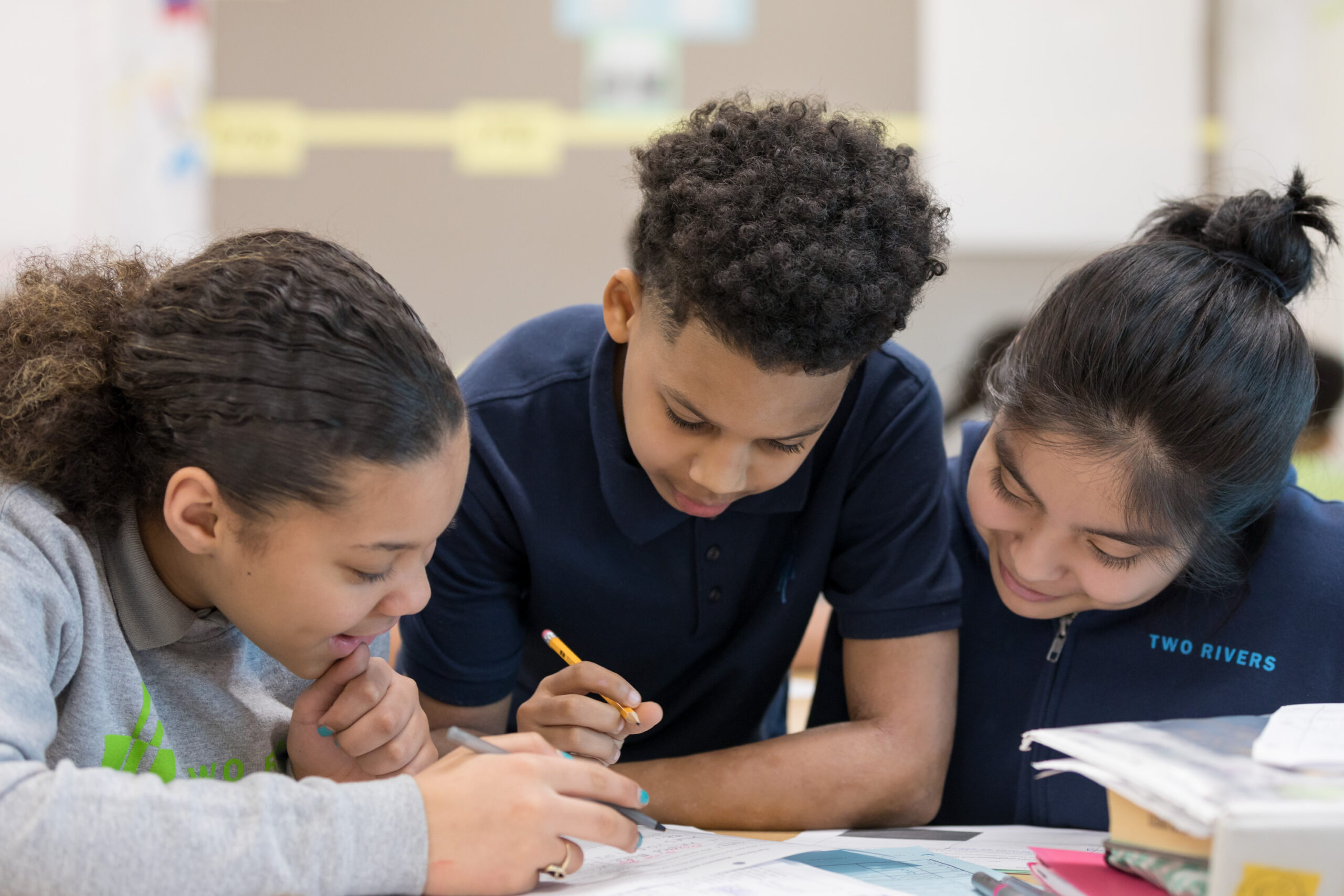
Two Rivers Public Charter Schools

Located in the northeast quadrant of Washington, DC, Two Rivers Public Charter Schools (Two Rivers) is a preK-3 through Grade 8 network that serves more than 900 students. Its mission is to nurture a diverse group of students to become lifelong, active participants in their own education, develop a sense of self and community, and become responsible and compassionate members of society.
The network follows the EL Education (EL) model, which drives the school experience. EL engages students and teachers in work that is challenging, adventurous, and meaningful. The model focuses on real-world learning, invigorating instruction, assessment, respectful culture, and leadership. At Two Rivers, this foundation served to create the five core values that guide the staff’s work: be thoughtful, learn better together, experience and grow, give access, and nurture relationships. The staff core values closely relate to the five Scholarly Habits: I know myself; I am independent and resilient; I show compassion and embrace diversity; I connect and collaborate; and I act with integrity.
Students are encouraged to take what they learn and apply it across contexts. The literacy curriculum is heavily integrated into the study of social studies and science, and the math program focuses on building conceptual understanding, adaptive reasoning, problem-solving, and computational fluency. In addition, students take Spanish, physical education, drama, art, and music classes that enrich classroom learning and challenge them to think and grow in new ways.
Perhaps one of the most distinguishing features of Two Rivers is the sense of responsibility to the greater school community. A vibrant group of people look after one another to propel individual learning goals and the network’s collective impact. Two Rivers’ leadership and teachers believe their success is mutually dependent on each other. This is exemplified in the EL motto, “We are crew, not passengers.” The network’s success is intertwined in the success of others and no one sits back like passengers on an ocean liner, but instead are the crew on a rowboat.
With this belief system, there is a uniquely robust focus on professional development. When you choose to become a teacher at Two Rivers, you must be intellectually curious, reflect and grow in your practice, and believe in the power of collaboration and working together. Three hours per week is devoted to professional development that is locally produced, not outsourced to other organizations or experts, and tailored to the Two Rivers experience. There are new staff days, two weeks for orientation, and full professional development days throughout the year. In addition, there is an extensive knowledge base system with tools and resources for teachers to access at any time.
Student population
72% Black or African American
15% White
8% Hispanic or Latino of any race
5% Two or more races
0% American Indian or Alaska Native
Charter initiatives
- Become an antiracist organization: The network is working to ensure that it is fully representing the diversity of Washington, DC in its student body, staff, board, and business partners. It is also building the capacity of everyone in the network to be self-aware about unconscious racial bias and to talk about these biases when witnessed. At the staff level, this is accomplished through professional development and with families, using a home-grown, award-winning program called Share Your DC. Lastly, it will audit and create systems to improve racial inequities. These levers are adapted from ProInspire’s Awake, Woke, and Work framework.
- Develop students’ agency: Students must have agency in academics as well as in social-emotional learning. Three instructional formats are used intentionally and flexibly throughout the curriculum: direct instruction, which uses direct modeling, guided practice, and independent practice; inquiry-based instruction, which includes opportunities to solve open-ended problems; and critique, which allows students to analyze the work of others to both construct and use criteria for revising work.
The details
- 30-credit master of arts in teaching (MAT) program
- Meet online with NYU Steinhardt faculty and peers twice per week in the evening for your course work ~15 hours/week
- ~40 hours/week in classroom residency at partner location
- Tuition subsidy and stipend or wage from partner school
- Two-year commitment following residency required
- Full-day cost details
During residency year
As a teacher resident, you will work alongside a teacher mentor for the entire school year. Your responsibilities increase as you progress in your teaching abilities. This immersive learning is designed to assist you with understanding your students and their learning process, setting you up to have a class of your own the following year.
Estimated Stipend
$35,000
Health Insurance
Full medical, dental, and vision benefits
Start Date
August 2024
After residency year
Job After Graduation
Teacher (full time)
Estimated Starting Salary with Master’s Degree
$71,798
The figures above are estimates provided by our partners for informational and planning purposes only. NYU Steinhardt does not guarantee these amounts.